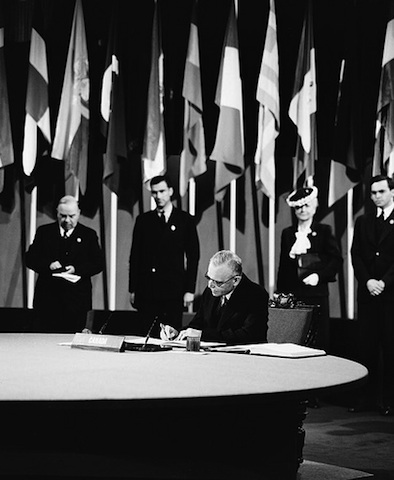It was no more than two years ago that Stephen Harper was enamoured of the United Nations. In fact nothing would do but that Canada simply must fill one of the rotating seats on the powerful UN Security Council. Exactly what Canada would offer in that valuable position was never known. Still, after a major lobbying campaign to garner commitments from UN member states, Portugal easily beat out Canada for the available seat.
The Harper government immediately understood their error. This humiliating repudiation had nothing to do with the government’s erratic and idiosyncratic foreign policies. What it obviously meant was that the United Nations really wasn’t up to Mr. Harper’s exacting standards. It was unworthy of Stephen Harper’s Canada. Since then, the UN, once the bipartisan heart of all Canadian foreign policy (as Brian Mulroney pointedly reminded the Globe editorial board this week), has played an insignificant role.
Two weeks ago, the PM spurned the opportunity to address the UN directly, instead travelling to New York to accept an award from a Jewish organization for being Israel’s single most reliable ally. Harper used his remarks to diminish the UN while giving notice of his refusal to “court every dictator with a vote at the United Nations.” He did not mention the government of China.
To make Canada’s position unmistakably clear, the PM then dispatched Foreign Affairs Minister John Baird to the UN General Assembly early this week to hammer home the point. It was a curious spectacle. The previous week, as the world watched, many heads of government led by President Barack Obama (though not Mr. Harper) had addressed the General Assembly. By the time Mr. Baird spoke, the cavernous chamber was almost empty. Few were listening, whether diplomats or media. According to Inner City Press, the UN media centre held fewer than a dozen journalists while Mr. Baird spoke, “most of them paying no attention.”
It was just as well. The UN is an almost impossible institution and needs many things. But the very last thing it needs was a petulant lecture on behalf of Stephen Harper’s Canada, more suitable to Mr. Baird’s confrontational performances in Parliament and devoid of a single constructive solution to any of the harsh criticisms he blithely threw about.
The United Nations, Mr. Baird said, “must spend less time looking at itself, and more time focused on the problems that demand its attention…. we cannot and will not participate in endless, fruitless inward-looking exercises.”
Whatever he might have meant, which is entirely unclear, the minister couldn’t be more wrong. The UN is indeed in so many ways so dysfunctional. Yet it is absolutely essential. So nothing is more important than making it work more effectively.
Mr. Baird went on to express his frustration, shared by most of the world, at the Security Council’s failure to resolve the Syrian crisis. Canada, he said, “continues to call for an immediate end to the violence. And [Syrian president] Assad must be replaced by a new order that protects Syria’s territorial integrity and respects all religious minorities.” Thanks a lot, Canada. Who would have guessed? Unfortunately, the government of Canada hasn’t a clue, any more than anyone else, how in the real world this result can be attained, and Minister Baird didn’t even pretend to try. He did not mention the government of China.
All this was very enigmatic indeed. It’s hard to figure who the PM and his minister were reaching out to in New York with their singularly unhelpful remarks: the world? Their Canadian base? The majority of Canadians? But what’s crystal clear is that the government’s decision to sideline the UN is a terrible mistake.
The UN is the world. That’s why it often works so poorly. And there really is no single UN. There are a thousands UNs. It’s a beast far too complicated to generalize about, though we all do. When you have 193 member states of every size, shape and persuasion, and thousands of bodies, councils, programs, agencies and commissions, not to mention the General Assembly and Security Council, you have our world — a vast disparate, wildly complex, barely controllable, barely understandable mess.
I have been involved with different parts of the UN in various capacities for decades. On every occasion I’ve emerged more depressed than when I began. Observing different parts of the institution up close, I’ve repeatedly marveled that the world hasn’t gone to complete hell in a handbasket long ago.
Yet many of the greatest advances in civilization have happened through some part or other of the UN octopus. And there are always women and men of good will attempting to make it function better, whether it’s through the Millennium Development Goals or the creation of UN Women or the Responsibility To Protect doctrine. Nothing is easier than to take the arrogant way out, repudiate the entire vast organism and its multitude of works, and walk away. And nothing is more destructive to the well-being of our species.
For all the UN’s tragic failures and egregious flaws, “Try to imagine the world without it,” as Mr. Mulroney told the Globe. It is, beyond dispute, one of humankind’s most remarkable achievements, ever. But here’s the ultimate irony. The UN is only too successful in accurately reflecting human nature. That’s why it’s indispensable yet will always disappoint.
Correction: Last week I said I couldn’t find which shadow cabinet position Justin Trudeau was offered by Stéphane Dion. In fact, Mr. Dion resigned as Liberal leader right after the 2008 election in which Mr. Trudeau was first elected and did not appoint another shadow cabinet. My bad.
This article was first published in the Globe and Mail.
Photo: United Nations Photo/Flickr



